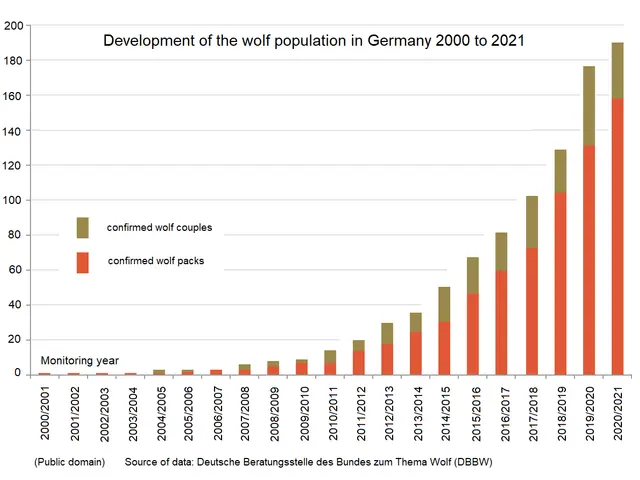Countdown to the Wedding: 885 Days Awaiting a Response
On August 9, 2025, Kathrin Pollnow and Klaus-Dieter Rose exchanged vows at the registry office on the market square in Oschersleben, marking a significant moment in their 15-year journey together.
Pollnow, a resident of the Matthias-Claudius-Haus, a facility run by the Diakonie for people with disabilities, and Rose, who assists in the kitchen and delivers food at the facility, have been living together in a small apartment in the same facility for over two years.
The couple's wedding was not met with obstacles from official bodies, but some families have expressed difficulties with the idea. Despite this, about 50 people attended the ceremony, including friends, family, and fellow residents from the facility.
The wedding ceremony took place under the watchful gaze of the old town hall, whose door bore the inscription: "Do justice and fear nothing." The mayor of Oschersleben, Benjamin Kanngießer, acknowledged that people may be uncertain about the wedding, but stressed the importance of equality and human rights.
The couple's road to marriage was not an easy one. They first visited the registry office in March 2023 to order the banns, but the proceedings were rejected due to a question about whether the couple was aware of the implications of marriage. Months of correspondence followed, including guardianship files, medical records, and expert opinions.
However, almost two years after their first visit, a decision was made at the beginning of the year that the registry office must perform the marriage. The state commissioner for the disabled in Saxony-Anhalt wrote a letter stating that the United Nations Convention on the Rights of Persons with Disabilities prohibits any form of discrimination.
In Germany, denial of marriage specifically due to disability as a unique legal case is not explicitly addressed in the family or immigration laws. However, the legal process of marriage and family reunification involves certain conditions that apply uniformly, regardless of disability status. The German Basic Law and human rights policies ensure equal marriage rights and protections for people with disabilities, and social rights for disabled spouses include entitlement to pensions such as the Great Widow’s Pension for disabled surviving spouses.
For someone facing marriage denial due to disability in Germany, the advisable legal process is to understand the legal grounds given and whether the denial contradicts anti-discrimination laws or marriage equality protections. Consulting specialized legal counsel or disability advocacy organizations for assistance and possible challenge procedures is also advisable. Using provisions for exceptional hardship and disability accommodations in immigration and family reunification law if applicable is another option. Seeking guidance from counseling centers or lawyers familiar with German family, disability, and human rights law is essential to safeguard marriage and residency rights.
Pollnow, who is accompanied by a carer when she goes shopping, plans to throw the bouquet at a later celebration. The wedding was concluded with confetti cannons, adding a joyous touch to the momentous occasion.
[1] Bundesamt für Migration und Flüchtlinge (2020). Ausländerrechtliche Bestimmungen für anerkannte Flüchtlinge. Retrieved from https://www.bamf.de/EN/Themen/Asyl/Asylverfahren/Anerkennung/Anerkennung/auslaenderrechtliche-bestimmungen-fuer-anerkannte-fluechtlinge/auslaenderrechtliche-bestimmungen-fuer-anerkannte-fluechtlinge-node.html
[2] Bundesministerium des Innern, für Bau und Heimat (2021). Allgemeine Einreisebestimmungen. Retrieved from https://www.bmi.bund.de/SharedDocs/FAQ/DE/Themen/Auslaender/Ausweisrecht/allgemeine-einreisebestimmungen.html
[3] Bundesministerium für Arbeit und Soziales (2022). Witwenrente. Retrieved from https://www.bmfsfj.de/DE/Arbeitslose/Arbeitslosengeld/Witwenrente/witwenrente-node.html
[4] Bundesministerium für Arbeit und Soziales (2022). Menschen mit Behinderung. Retrieved from https://www.bmfsfj.de/DE/Themen/Gesundheit/Behinderung/menschen-mit-behinderung-node.html
[5] Bundesministerium für Familie, Senioren, Frauen und Jugend (2021). Gleichstellung. Retrieved from https://www.bmfsfj.de/DE/Themen/Gleichstellung/gleichstellung-node.html
- As Kathrin Pollnow and Klaus-Dieter Rose, residents of a health-and-wellness facility focused on mental-health care, navigated their unique path to marriage, they discovered the importance of advocacy and understanding their rights under various German laws and policies regarding disability, equality, and human rights.
- In their celebration of love, Pollnow and Rose also emphasized the significance of mental health and wellness, aiding as well-rounded examples of pushing boundaries and pursuing happiness, despite any external obstacles posed by others.




